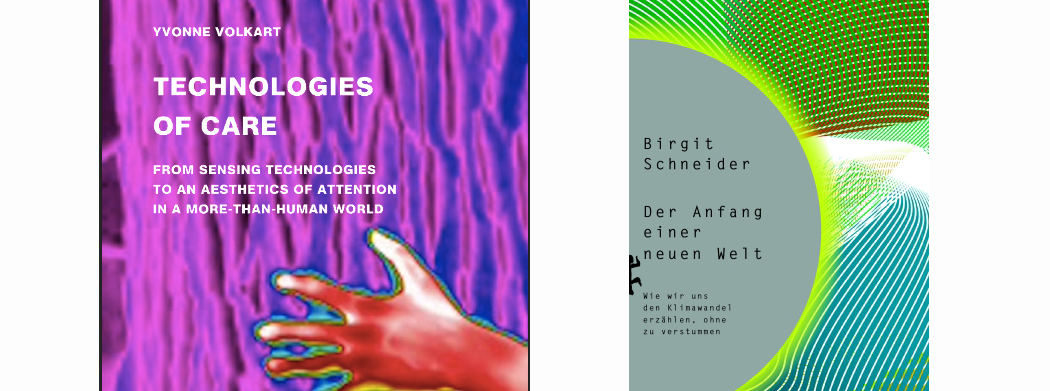Caring and Narrating
Aesthetic Strategies to Counter the Climate Crisis
/rosa

About the event
Join us at /rosa (Rosa-Luxemburg-Straße 35, Berlin Mitte) for book launch on Friday, December 1 at 19:00.
Live stream: https://www.panke.gallery/streaming
What are the possibilites of ecoaesthetics and ecosensibility in the intersection of art, science and technology in times of climate crisis? Birgit Schneider and Yvonne Volkart will address these questions when presenting their new books. They will talk about the question of how the social and ecological consequences of global warming are technically sensed, bodily felt and experienced and to what extent different ways of perceiving have a political impact. And how different perspectices can open up new narratives about the ecological crisis and new entry points of care and action.
Yvonne Volkart: Technologies of Care. From Sensing Technologies to an Aesthetics of Attention in a More-than-Human World, Zürich: diaphanes 2023: open access: https://www.diaphanes.net/titel/technologies-of-care-7046
In the art of the last decade, a relational, cross-species turn has taken place—a techno-eco-feminist turn toward the environmental, toward ontologies of becoming-together and caring for the Earth. It is a new sensibility toward planet Earth’s grounding on physical forces, in the midst of the total technologization of the world. This eco-sensibility is based on technologies, practices, and aesthetics in art that enable, poeticize, celebrate, and deploy paying attention to the more-than-human as a political practice of desire and counterappropriation of dispossessed worlds––in short, Technologies of Care. In this process, technical means and data play an essential role; especially as they come with the hope that, on the one hand, measuring data can be used to render the factuality of unknown or denied environmental phenomena and, on the other hand, that they generate new forms of attention toward the environment. The author claims, though, that the potential of technologies of care is to be sought less in the use of innovative technologies and well-intentioned themes than in the enabling of aesthetic experiences of co-existence with earthly beings, and their difference and foreignness. Her argumentation is based on the in-depth analysis of exemplary artistic projects; many of them are in the interdisciplinary field of art and science––an ideal site for strange encounters, and processes of mutual translation and distortion. The value of artistic practices, she states, does not lie in the visualization and transposition of abstract data into a language that touches. Rather, it lies in trans-making things, and in the disturbing effects that such acts of disfiguring trigger: the creation of cross-species commonalities instead of the othering which prevails in the dominant discourse.
Birgit Schneider: Der Anfang einer neuen Welt. Wie wir vom Klimawandel erzählen, ohne zu verstummen. Berlin: Matthes & Seitz 2023. (The beginning of a new world. How we narrate climate change without falling silent)
The consequences of global warming are becoming increasingly apparent. They can now also be felt in Germany. They are confirmed by ever new measurement record. Changes in the global climate reveal a destabilised world that we no longer recognise as our own. When talking about climate change, many therefore fall into a downward spiral, at the end of which they run out of words. The lack of language seems contradictory at first, as few topics have been talked about so much in recent years. But there is a gap between words and imagination that is frightening to bridge. Birgit Schneider tries to find answers to the question of how people in temperate latitudes visualise climate change and what imaginations and stories guide them. She emphasises changes of perspective, contradictions and unusual points of view that are able to expand our limited imagination. Because in order to bridge the gap between knowledge and action, it makes a big difference how we tell ourselves about climate change.
Speakers
Speakers
Yvonne Volkart is head of research and lecturer of art theory and cultural media studies at the Institute Art Gender Nature, Basel Academy of Art and Design FHNW. She also holds a teaching position at the Master of Arts in Art Education, Zurich University of the Arts and works as freelance curator and art critic. She directs the SNSF-research project Plants_Intelligence. Learning like a Plant (2022-25), and led the SNSF-research project Ecodata–Ecomedia–Ecoaesthetics (2017-21) of which her monograph Technologies of Care. From Sensing Technologies to an Aesthetics of Attention (Zürich: diaphanes 2023) is the last outcome. In collaboration with Sabine Himmelsbach and Karin Ohlenschläger she curated the exhibition and book projects Eco-Visionaries. Art, Architecture and New Media After the Anthropocene (Hatje Cantz 2018) and Ecomedia. Ecological Strategies in Today’s Art (Hatje Cantz 2007). Her concerns lie in the modes how aesthetic theory-practice, ecology, technology, science, and decolonial feminism come together and bring us in relation to the world.
Birgit Schneider is a scholar of media culture and visual studies with a strong interest in environmental humanities. She is Professor of Knowledge Cultures and Media Environments at the University of Potsdam, Institute for Art and Media. Her research focuses on technical and scientific images, with a strong emphasis on questions of media aesthetics and archaeology, techné, ecology, maps, diagrams and textiles from the 17th century to the present. A major focus of her research is the visual communication of climate since 1800 and a genealogy of the visualisation of climate change between science, aesthetics and politics. Her monographs on the subject were published in 2018, entitled Klimabilder. Eine Genealogie der Bildpolitiken von Klima und Klimawandel and in 2023: Der Anfang einer neuen Welt. Wie wir uns vom Klimawandel erzählen, ohne zu verstummen (Berlin). Another book on the subject is the edited volume „Image Politics of Climate Change“ (Bielefeld 2014).
Moderation
Cornelia Sollfrank, artist, researcher, writer. https://artwarez.org